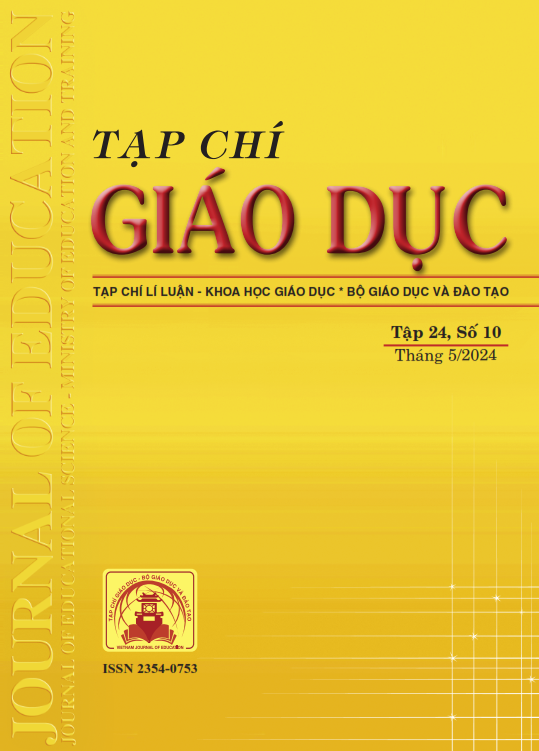Nghiên cứu ảnh hưởng của trí tuệ nhân tạo trong giáo dục tới hoạt động học tập của sinh viên
Tóm tắt
Artificial intelligence in education has been of interest to the world since the 70s of the twentieth century and has an increasingly strong influence on the world’s current education as well as in Vietnam. The study clarifies the effects of Artificial Intelligence on the learning activities of university students. The results show that there are positive effects such as: better lesson preparation activities, lecturing, interactions, and lecturers evaluation of students; better students’ comprehension; self-study and self-research activities . AI also helps students choose online and distance learning programs to study in parallel with the classroom program. Moreover, AIED facilitates students’ interactions with each other, studying and working in groups. Yet, some negative effects of using AI include increasing students' dependence and laziness; unverifiable nature of knowledge provided by AI to learners; issues of “integrity” in authentic student works and those by Artificial Intelligence; the rigidity and machinery of AI impede learners’ perceptions of the emotional and cultural state of online learning activities. Finding solutions to overcome the negatives is an open direction that calls for attention from the scientific and social community.
Tài liệu tham khảo
Cen, H., Koedinger, K. R., & Junker, B. (2007). Is Over Practice Necessary?-improving learning efficiency with the cognitive tutor through Educational Data Mining. Frontiers in Artificial Intelligence and Applications, 158, 511.
Chen, L., Chen, P., & Lin, Z. (2020). Artificial intelligence in education: A review. Ieee Access, 8, 75264-75278.
Collins, A., & Halverson, R. (2010). The second educational revolution: rethinking education in the age of technology. Journal of Computer Assisted Learning, 26(1), 18-27.
Đặng Ứng Vận, Đặng Khánh Hội, Lê Thị Huyền Trang (2022). Ứng dụng trí tuệ nhân tạo xác định chuẩn đầu ra của chương trình đào tạo đáp ứng năng lực của các vị trí việc làm. Trong Hội thảo khoa học quốc gia (UNC): Nghiên cứu và giảng dạy ngoại ngữ, ngôn ngữ và quốc tế học tại Việt Nam. NXB Đại học Quốc gia Hà Nội, quyển 1, tr. 600-609.
Đinh ThịMỹ Hạnh, Trần Văn Hưng (2021). Trí tuệ nhân tạo trong giáo dục: cơ hội và thách thức đến tương lai của việc dạy và học ở trường đại học. Tạp chí Khoa học và Công nghệ, Đại học Đà Nẵng, 19(2), 38-42.
Hinojo-Lucena, F. J., Aznar-Díaz, I., Cáceres-Reche, M. P., & Romero-Rodríguez, J. M. (2019). Artificial intelligence in higher education: A bibliometric study on its impact in the scientific literature. Education Sciences, 9(1), 51. https://doi.org/10.3390/educsci9010051
Hồ Đắc Lộc, Huỳnh Châu Duy (2020). Phát triển trí tuệ nhân tạo tại Việt Nam: Thực trạng và giải pháp. Tạp chí Khoa học và công nghệ Việt Nam, 1+2, 27-31.
IBM (2008). In the fall of 2008, in the midst of a global economic crisis, IBM began a conversation with the world about the promise of a smarter planet and a new strategic agenda for progress and growth.
Kay, J. (2015). Whither or wither AI of AIED?, Seventeenth International Conference on Artificial Intelligence in Education (AIED 2015 Workshop Proceedings), 4(85) (pp. 1-10), http://users.sussex.ac.uk/~bend/aied2015/
Kirschner, P. A., Sweller, J., & Clark, R. E. (2006). Why minimal guidance during instruction does not work: An analysis of the failure of constructivist, discovery, problem-based, experiential, and inquiry-based teaching. Educational Psychologist, 41(2), 75-86.
Nguyễn Duy An (2021). Ứng dụng trí tuệ nhân tạo trong việc dạy học ở trường đại học tại Việt Nam. Kỉ yếu hội thảo “Chuyển đổi số: Cách tiếp cận lấy người học làm trung tâm ứng dụng trong phương pháp dạy học kết hợp”. Trường Đại học Ngoại ngữ - Tin học TP. Hồ Chí Minh, tr 484-492.
Nguyễn Thanh Thủy, Hà Quang Thụy, Phan Xuân Hiếu, Nguyễn Trí Thành (2018). Trí tuệ nhân tạo trong thời đại số: Bối cảnh thế giới và liên hệ với Việt Nam. Tạp chí Công thương. https://tapchicongthuong.vn/bai-viet/tri-tue-nhan-tao-trong-thoi-dai-so-boi-canh-the-gioi-va-lien-he-voi-viet-nam-55038.htm
Nguyễn Thị Phước (2023). Sử dụng chat GPT làm công cụ hỗ trợ trong việc dạy và học ngành truyền thông. Tạp chí Khoa học, Trường Đại học Quốc tế Hồng Bàng, 25, 95-100. https://doi.org/10.59294/HIUJS.25.2023.507
Popenici, S. A., & Kerr, S. (2017). Exploring the impact of artificial intelligence on teaching and learning in higher education. Research and Practice in Technology Enhanced Learning, 12(1), 22. https:doi.org/10.1186/s41039-017-0062-8
Roll, I., & Wylie, R. (2016). Evolution and revolution in artificial intelligence in education. International Journal of Artificial Intelligence in Education, 26, 582-599.
Tobias, S., & Duffy, T. M. (2009). Constructivist instruction: success or failure? (p. 392). New York: Taylor & Francis.
Trường Đại học Đông Á (2022). Một số ứng dụng của Trí tuệ nhân tạo trong giáo dục đổi mới. https://tuyensinhdonga.edu.vn/tri-tue-nhan-tao-trong-giao-duc
VanLehn, K. (2006). The behavior of tutoring systems. International Journal of Artificial Intelligence in Education, 16(3), 227-265.
VanLehn, K. (2011). The relative effectiveness of human tutoring, intelligent tutoring systems, and other tutoring systems. Educational Psychologist, 46(4), 197-221.
Zawacki-Richter, O., Marín, V. I., Bond, M., & Gouverneur, F. (2019). Systematic review of research on artificial intelligence applications in higher education–where are the educators?. International Journal of Educational Technology in Higher Education, 16(1), 1-27.
Zhiming, Y., Xiaxia, T., Xuan, Q., Fei, Z., & Yuanmei, D. (2017). The connotations, key technologies and application trends of educational artificial intelligence (EAI): Interpretation and analysis of the two reports entitled “preparing for the future of artificial intelligence” and “the national artificial intelligence research and development strategic plan”. Journal of Distance Education, 1, 26-35.
Tải xuống
Đã Xuất bản
Cách trích dẫn
Số
Chuyên mục
Giấy phép

Tác phẩm này được cấp phép theo Ghi nhận tác giả của Creative Commons Giấy phép quốc tế 4.0 .












